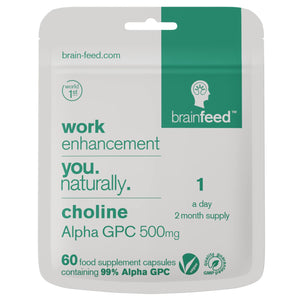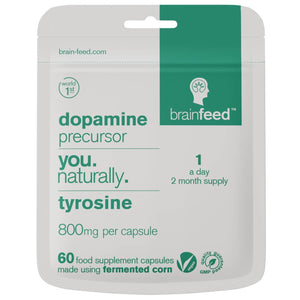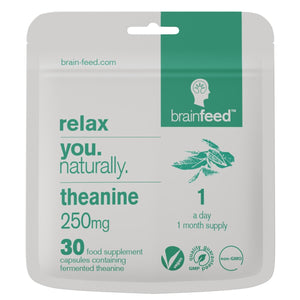Andrew Huberman Supplements list for focus: Stanford Neuroscientist recommends
filter
Key points
- Andrew Huberman supplements list for focus: Alpha GPC, Tyrosine & caffeine
- It boosts memory, focus and motivation brain chemicals
- Caffeine can cause jitters so combining it with theanine ensures calm focus
Andrew Huberman is a Professor of Neurobiology & Ophthalmology at Stanford University. He started his podcast, the Huberman Lab Podcast in 2021 where he talks about the brain and neuroscience. It is currently one of the top 15 podcasts worldwide. He has over 1 million followers on social media and is a credential source in a sea of non-evidence-based influencers. With a PhD in neuroscience and over 20 years of experience in the field, Dr Huberman knows what he is talking about.
What supplements does Andrew Huberman recommend?
His nootropic (cognitive enhancer) stack compromises Alpha GPC, L-tyrosine, and caffeine. This is the science behind Andrew Huberman supplements list and how they enhance brain health:
Alpha GPC
Your learning, attention and memory brain chemical is acetylcholine. The memory area in your brain is rich in acetylcholine-producing cells[1 Trusted Source 2022 - Journal of Neurorestoratology Systematic and meta-analysis Acetylcholine bidirectionally regulates learning and memory ] . This brain chemical is also directly involved in attention tasks, by prioritising brain activity in active areas and eliminating distractions to help you focus. To make adequate acetylcholine, you must ensure a good supply of its building block, choline. It is found in protein-rich foods like beef liver, eggs, and almonds. So, what does Andrew Huberman recommend for memory? One of the most efficient supplemental forms of choline, Alpha GPC. Alpha GPC can easily enter the brain and has one of the highest choline contents in supplements. (41% of choline by weight). brain feed has created the world’s 1st 500 mg Alpha GPC capsule containing 99% Alpha GPC* (the purest form of Alpha GPC). It works quickly by increasing acetylcholine levels within 1-3 hours after intake[2 Trusted Source 1992 - International Journal of Clinical Pharmacology, Therapy, and Toxicology Human study A comparative study of free plasma choline levels following intramuscular administration of L-alpha-glycerylphosphorylcholine and citicoline in normal volunteers ] .
How much Alpha-GPC does Andrew Huberman take?
He mentioned a 300-600 mg intake of Alpha GPC to enhance learning[3 Trusted Source The Neuro Explorer 3rd-party source NEUROSCIENTIST Reveals His NOOTROPIC STACK ] . A 29-year-long review of different studies found that 1200mg alpha GPC improved memory scores in over 400 people[4 Trusted Source 2023 - Journal of Alzheimer's Disease Systematic and meta-analysis Activity of Choline Alphoscerate on Adult-Onset Cognitive Dysfunctions: A Systematic Review and Meta-Analysis ] . Those supplementing also saw an increase in attention scores[5 Trusted Source 2001 - Mechanisms of Ageing and Development Systematic and meta-analysis Choline alphoscerate in cognitive decline and in acute cerebrovascular disease: an analysis of published clinical data ] .
L-tyrosine
Your reward and pleasure brain chemical is called dopamine. Feel-good activities like good food, sex, exercise, and thrill-seeking bring an influx of dopamine. What does Andrew Huberman say about dopamine? Dopamine is deeply involved in motivation and drive. Those with high levels of self-motivation were found to have higher dopamine release in the reward and motivation brain areas[6 Trusted Source 2012 - The Journal of Neuroscience Human study Dopaminergic Mechanisms of Individual Differences in Human Effort-Based Decision-Making ] . According to Huberman, dopamine loves novelty, with brain scan studies showing increased release when subjected to new experiences[7 Trusted Source 2006 - Neuron Absolute coding of stimulus novelty in the human substantia nigra/VTA ] . You can incorporate its role in reward and motivation to try and excel at new skills. The building block of dopamine is L-tyrosine, found in protein-rich foods such as cheese, tofu, and beef. You can also find supplemental forms of L tyrosine. Huberman takes L-tyrosine to increase dopamine levels. Upon intake, L-tyrosine levels peak after 1-2 hours and remain in the blood for up to 8 hours[8 Trusted Source 2024 - Examine Examine L-Tyrosine ] . Dr Huberman recommends a 500-1000 mg intake of L-tyrosine to enhance dopamine production[5 Trusted Source 2001 - Mechanisms of Ageing and Development Systematic and meta-analysis Choline alphoscerate in cognitive decline and in acute cerebrovascular disease: an analysis of published clinical data ] . brain feed has created the world’s 1st natural 800mg tyrosine capsule from fermented corn.
Caffeine
Caffeine, the stimulant commonly found in tea and coffee, is another tool in Dr Huberman’s toolkit. After intake, caffeine levels peak within 30-60 mins[9 Trusted Source 2015 - Current neuropharmacology Systematic and meta-analysis Caffeine: Cognitive and Physical Performance Enhancer or Psychoactive Drug? ] , which helps explain why you feel alert soon after your first cup of coffee in the morning. Caffeine works by blocking a brain chemical that promotes sleep (adenosine)[9 Trusted Source 2015 - Current neuropharmacology Systematic and meta-analysis Caffeine: Cognitive and Physical Performance Enhancer or Psychoactive Drug? ] . A shot of espresso provides an average of 60 mg of caffeine[10 Trusted Source 2017 - Healthline 3rd-party source How Much Caffeine in a Cup of Coffee? A Detailed Guide ] . 150mg of caffeine can enhance alertness on cognitive performance for 10 hours[11 Trusted Source 1993 - Psychopharmacology Research evaluation Does caffeine intake enhance absolute levels of cognitive performance? ] . A balance is needed because, at high doses of 500-600 mg, caffeine can increase heart rate and shivers[9 Trusted Source 2015 - Current neuropharmacology Systematic and meta-analysis Caffeine: Cognitive and Physical Performance Enhancer or Psychoactive Drug? ] . As opposed to improvements in memory functions, caffeine performs simpler enhancements like improved reaction time and alertness[12 Trusted Source 2016 - Neuroscience & Biobehavioral Reviews Research evaluation A review of caffeine’s effects on cognitive, physical and occupational performance ] . This is particularly useful in situations of mental fatigue. Military individuals and long-distance drivers who were required to stay focused for long periods had better vigilance after 200 mg doses of caffeine[12 Trusted Source 2016 - Neuroscience & Biobehavioral Reviews Research evaluation A review of caffeine’s effects on cognitive, physical and occupational performance ] . Though it helps to wake you up, excess caffeine intake can make you jittery and must be stayed clear of, as per Andrew Huberman. Sleep-deprived individuals have also seen benefits on 100-300mg, which can limit the errors performed on attention tasks.
L-theanine
Featured in Andrew Huberman sleep cocktail compared to his cognitive enhancer stack theanine, is another supplement Huberman claims to use. L-theanine is a natural compound first found in the tea plant[13 Trusted Source 2020 - Plant Foods for Human Nutrition Systematic and meta-analysis The Effects of Green Tea Amino Acid L-Theanine Consumption on the Ability to Manage Stress and Anxiety Levels: a Systematic Review ] , [14 Trusted Source 2011 - Journal of the Science of Food and Agriculture Research evaluation L-Theanine: properties, synthesis and isolation from tea ] . Constituting 1-2% of the dry weight of green tea, l-theanine is also found in small amounts in some food sources and supplemental forms[15 Trusted Source 2006 - American Journal of Health-System Pharmacy Research evaluation Pharmacology and therapeutic uses of theanine ] . L-theanine helps you relax while still keeping you alert by increasing your relaxation chemical GABA as well as brain waves linked to focus known as alpha waves[16 Trusted Source 2011 - Journal of Functional Foods Human study Effects of l-theanine on attention and reaction time response ] , [17 Trusted Source 2017 - Canadian Journal of Physiology and Pharmacology Human study Caffeine and theanine exert opposite effects on attention under emotional arousal ] , [18 Trusted Source 2022 - Cleveland Clinic 3rd-party source Gamma-Aminobutyric Acid (GABA) ] , [19 Trusted Source 2019 - Psychology Today 3rd-party source 3 Amazing Benefits of GABA ] , [20 Trusted Source 2008 - Asia Pacific Journal of Clinical Nutrition Human study L-theanine, a natural constituent in tea, and its effect on mental state ] . A study on 18 healthy university students showed that l-theanine supplementation resulted in improved attention and faster reaction times[21 Trusted Source 2011 - Journal of Functional Foods Human study Effects of l-theanine on attention and reaction time response ] . The researchers also recorded an enhanced activity of the alpha brain waves which enhance your ability to absorb new information and boost your creative thinking[22 Trusted Source 2022 - Food Quality and Preference Systematic and meta-analysis Drinking tea improves the convergent creativity performance ] . Discover how l-theanine and caffeine for caffeine jitters are a good combo[23 Trusted Source 2018 - Nutrition Research l-Theanine and caffeine improve target-specific attention to visual stimuli by decreasing mind wandering: a human functional magnetic resonance imaging study ] . brain feed’s l-theanine is extracted from green tea. It is kept as pure as possible to ensure science-based results.
Dr Huberman’s focus formula
Andrew Huberman recommended supplements when performing intense work, involving a combination of those 3 supplements. Andrew Huberman routine is taking the following to maximise his alertness and concentration: Alpha GPC + tyrosine + caffeine. This winning combination contains nutrients that improve focus, and increase motivation, reaction times and alertness to maximise productivity. Additionally, theanine supports alertness and makes a great pair together with caffeine. Although Andrew Huberman covers these nutrients individually, the Calm & in the zone bundle makes it easy to take them together.
What supplement brand does Andrew Huberman use?
Andrew recommends several different supplement brands on his podcast with the common denominator being brands with a focus on potency, purity and efficacy. brain feed has the world's 1st 99% Alpha GPC 500mg capsules and the world's 1st 800mg tyrosine from fermented corn ticking all 3 of the above criteria.
Image courtesy of Jamesbrianbounds, CC BY-SA 4.0, via Wikimedia Commons
References
[1] Huang, Q., Liao, C., Ge, F., Ao, J. and Liu, T. (2022). Acetylcholine bidirectionally regulates learning and memory. Journal of Neurorestoratology, 10(2), p.100002. https://www.sciencedirect.com/science/article/pii/S2324242622000985?via%3Dihub
[2] Gatti, G., Barzaghi, N., Acuto, G., Abbiati, G., Fossati, T., & Perucca, E. (1992). A comparative study of free plasma choline levels following intramuscular administration of L-alpha-glycerylphosphorylcholine and citicoline in normal volunteers. International Journal of Clinical Pharmacology, Therapy, and Toxicology, 30(9), 331–335. https://findanexpert.unimelb.edu.au/scholarlywork/1702484-a-comparative-study-of-free-plasma-choline-levels-following-intramuscular-administration-of-l-%CE%B1-glycerylphosphorylcholine-and-citicoline-in-normal-volunteers
[3] www.youtube.com. (n.d.). NEUROSCIENTIST Reveals His NOOTROPIC STACK. [online] https://www.youtube.com/watch?v=ZgkUpfkP90E
[4] Sagaro, G. G. et al. (2023). Activity of Choline Alphoscerate on Adult-Onset Cognitive Dysfunctions: A Systematic Review and Meta-Analysis. Journal of Alzheimer's disease : JAD, 10.3233/JAD-221189. Advance online publication. https://journals.sagepub.com/doi/full/10.3233/JAD-221189
[5] Parnetti, L. et al. (2001). Choline alphoscerate in cognitive decline and in acute cerebrovascular disease: an analysis of published clinical data. Mechanisms of Ageing and Development, 122(16), pp.2041–2055. https://www.sciencedirect.com/science/article/abs/pii/S0047637401003128?via%3Dihub
[6] Treadway, M.T. et al. (2012). Dopaminergic Mechanisms of Individual Differences in Human Effort-Based Decision-Making. The Journal of Neuroscience, [online] 32(18), pp.6170–6176. https://www.jneurosci.org/content/32/18/6170
[7] Bunzeck, N. et al. (2006). Absolute Coding of Stimulus Novelty in the Human Substantia Nigra/VTA. Neuron, 51(3), pp.369–379. https://www.cell.com/neuron/fulltext/S0896-6273(06)00475-2?_returnURL=https%3A%2F%2Flinkinghub.elsevier.com%2Fretrieve%2Fpii%2FS0896627306004752%3Fshowall%3Dtrue
[8] Willis, B. (2024). L-Tyrosine. Examine. https://examine.com/supplements/l-tyrosine/?srsltid=AfmBOoq57e9fFPn8DvBSL3S60gA3kmNfxAfokZkzAF6yoOLi7AYf9wIW
[9] Cappelletti, S., Piacentino, D., Sani, G., & Aromatario, M. (2015). Caffeine: cognitive and physical performance enhancer or psychoactive drug?. Current neuropharmacology, 13(1), 71–88. https://www.eurekaselect.com/article/63919
[10] Healthline. (2017). How Much Caffeine in a Cup of Coffee? A Detailed Guide. [online] https://www.healthline.com/nutrition/how-much-caffeine-in-coffee#:~:text=The%20average%20caffeine%20content%20of,of%20caffeine%20(on%20average).
[11] Jarvis M. J. (1993). Does caffeine intake enhance absolute levels of cognitive performance?. Psychopharmacology, 110(1-2), 45–52. https://link.springer.com/article/10.1007/BF02246949
[12] McLellan, T.M., Caldwell, J.A. and Lieberman, H.R. (2016). A review of caffeine’s effects on cognitive, physical and occupational performance. Neuroscience & Biobehavioral Reviews. https://www.sciencedirect.com/science/article/pii/S0149763416300690?via%3Dihub
[13] Williams, J. L., Everett, J. M., D’Cunha, N. M., Sergi, D., Georgousopoulou, E. N., Keegan, R. J., McKune, A. J., Mellor, D. D., Anstice, N., & Naumovski, N. (2020). The Effects of Green Tea Amino Acid L-Theanine Consumption on the Ability to Manage Stress and Anxiety Levels: A Systematic Review. Plant Foods for Human Nutrition, 75(1), 12–23. https://link.springer.com/article/10.1007/s11130-019-00771-5
[14] Vuong, Q. V., Bowyer, M. C., & Roach, P. D. (2011). L-Theanine: Properties, synthesis and isolation from tea. Journal of the Science of Food and Agriculture, 91(11), 1931–1939. https://scijournals.onlinelibrary.wiley.com/doi/10.1002/jsfa.4373
[15] Eschenauer, G., & Sweet, B. V. (2006). Pharmacology and therapeutic uses of theanine. American Journal of Health-System Pharmacy, 63(1), 26–30. https://academic.oup.com/ajhp/article-abstract/63/1/26/5134445?redirectedFrom=fulltext
[16] Higashiyama, A., Htay, H. H., Ozeki, M., Juneja, L. R., & Kapoor, M. P. (2011). Effects of l-theanine on attention and reaction time response. Journal of Functional Foods, 3(3), 171–178. https://www.sciencedirect.com/science/article/pii/S1756464611000351?via%3Dihub
[17] Giles, G. E., Mahoney, C. R., Brunyé, T. T., Taylor, H. A., & Kanarek, R. B. (2017). Caffeine and theanine exert opposite effects on attention under emotional arousal. Canadian Journal of Physiology and Pharmacology, 95(1), 93–100. https://cdnsciencepub.com/doi/10.1139/cjpp-2016-0498
[18] Gamma-Aminobutyric Acid (GABA) (2022). Cleveland Clinic. https://my.clevelandclinic.org/health/articles/22857-gamma-aminobutyric-acid-gaba#:~:text=It%20slows%20down%20your%20brain,with%20anxiety%2C%20stress%20and%20fear
[19] Breus, M. J. (2019). 3 Amazing Benefits of GABA. Psychology Today. https://www.psychologytoday.com/gb/blog/sleep-newzzz/201901/3-amazing-benefits-gaba
[20] Nobre, A. C., Rao, A., & Owen, G. N. (2008). L-theanine, a natural constituent in tea, and its effect on mental state. Asia Pacific Journal of Clinical Nutrition, 17(S1), 167–168. https://apjcn.nhri.org.tw/server/apjcn/17%20Suppl%201/167.pdf
[21] Higashiyama, A., Htay, H. H., Ozeki, M., Juneja, L. R., & Kapoor, M. P. (2011). Effects of l-theanine on attention and reaction time response. Journal of Functional Foods, 3(3), 171–178. https://www.sciencedirect.com/science/article/pii/S1756464611000351?via%3Dihub
[22] Jiang, Y., Huang, Y., Wu, Y., & Wang, L. (2022). Drinking tea improves the convergent creativity performance. Food Quality and Preference, 95, 104360. https://www.sciencedirect.com/science/article/abs/pii/S0950329321002421?via%3Dihub
[23] Kahathuduwa, C. N., Dhanasekara, C. S., Chin, S.-H., Davis, T., Weerasinghe, V. S., Dassanayake, T. L., & Binks, M. (2018). l-Theanine and caffeine improve target-specific attention to visual stimuli by decreasing mind wandering: a human functional magnetic resonance imaging study. Nutrition Research (New York, N.Y.), 49, 67–78. https://www.sciencedirect.com/science/article/abs/pii/S0271531717304967?via%3Dihub


 alertness
alertness
 cognition
cognition
 sleep
sleep
 wellbeing
wellbeing















Leave a comment
Open tab